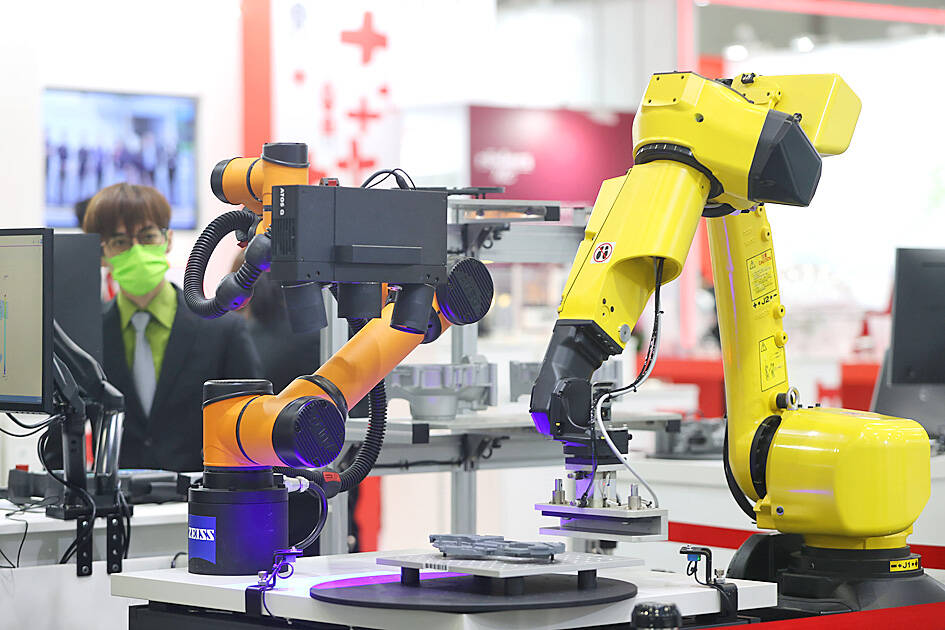Taiwan’s entity list is to be updated following a review by a cross-ministerial committee in early April to ensure the list is in line with international export sanctions on Russia, according to the Ministry of Economic Affairs (MOEA), which also promised more subsidies for the country’s machinery industry which has been negatively impacted by the restrictions.
The US recently announced its largest package of sanctions against Russia, totaling 500 individuals and entities. The European Union also issued its 13th sanctions package last week, which not only increases the number of sanctioned entities but also prohibits the export of key components for drones to Russia.
Taiwan’s entity list has so far banned 1,900 military-related Russian entities from receiving Taiwanese-made high-tech goods, according to the International Trade Administration.

Photo: CNA
A MOEA official said the ministry continues to reference the practices of allied countries and undertake rolling reviews of the entity list.
The recently expanded sanctions issued by the US and the EU target machine tools, automobiles and drone components, but the adjustment is expected to have little impact on Taiwanese manufacturers, the official said.
The official explained that Taiwan’s supply chain is only involved in some of the expanded targeted industries, adding that Taiwan has also been closely observing international sanctions.
Early this month, the ministry added 77 items to the list of machine tools restricted from being exported to Russia and Belarus, which is set to take effect on March 8.
The official acknowledged that the export restrictions have a negative impact on Taiwan’s manufacturers of machine tools, machinery and machine components, as Taiwan’s export to Russia fell 35.1 percent from 2021 to US$850 million in 2022 and to US$790 million last year. Exports to Russia last month totaled US $62.51 million, representing a further year-on-year decrease of 12.5 percent.
Taiwan Association of Machinery Industry (TAMI, 台灣機械公會) chairman Larry Wei (魏燦文) on Tuesday said the restrictions on exporting machine tools to Russia and Belarus have benefited Chinese manufacturers, as exports of Chinese machine tools to Russia increased 60 percent last year, compared to a year earlier.
"This is giving away the market to China for free," Wei said, lamenting the losses caused by political factors and calling on the government to provide subsidies or other support measures.
Taiwan’s machinery industry has also been battered by other factors including the exchange rate of the New Taiwan dollar to the US dollar, the TAMI head said.
The Japanese yen has depreciated 12 percent recently against the greenback, making the NT dollar relatively strong and affecting the industry’s competitiveness in overseas markets, Wei said, hoping the rate will remain at NT$32 against the US dollar.
An official with the Industrial Development Administration (IDA) told CNA that the MOEA has earmarked NT$300 million for the machine tool industry to focus on high-value and de-carbonized operations.
About NT$200 million will introduce smart machinery, and another NT$100 million be used to develop domestically made high-value machine tool controllers and product category rules — which provide product category-specific guidance to assess the environmental impact of a product’s life cycle and conduct carbon footprint calculations, the IDA official said.

The US dollar was trading at NT$29.7 at 10am today on the Taipei Foreign Exchange, as the New Taiwan dollar gained NT$1.364 from the previous close last week. The NT dollar continued to rise today, after surging 3.07 percent on Friday. After opening at NT$30.91, the NT dollar gained more than NT$1 in just 15 minutes, briefly passing the NT$30 mark. Before the US Department of the Treasury's semi-annual currency report came out, expectations that the NT dollar would keep rising were already building. The NT dollar on Friday closed at NT$31.064, up by NT$0.953 — a 3.07 percent single-day gain. Today,

‘SHORT TERM’: The local currency would likely remain strong in the near term, driven by anticipated US trade pressure, capital inflows and expectations of a US Fed rate cut The US dollar is expected to fall below NT$30 in the near term, as traders anticipate increased pressure from Washington for Taiwan to allow the New Taiwan dollar to appreciate, Cathay United Bank (國泰世華銀行) chief economist Lin Chi-chao (林啟超) said. Following a sharp drop in the greenback against the NT dollar on Friday, Lin told the Central News Agency that the local currency is likely to remain strong in the short term, driven in part by market psychology surrounding anticipated US policy pressure. On Friday, the US dollar fell NT$0.953, or 3.07 percent, closing at NT$31.064 — its lowest level since Jan.

The New Taiwan dollar and Taiwanese stocks surged on signs that trade tensions between the world’s top two economies might start easing and as US tech earnings boosted the outlook of the nation’s semiconductor exports. The NT dollar strengthened as much as 3.8 percent versus the US dollar to 30.815, the biggest intraday gain since January 2011, closing at NT$31.064. The benchmark TAIEX jumped 2.73 percent to outperform the region’s equity gauges. Outlook for global trade improved after China said it is assessing possible trade talks with the US, providing a boost for the nation’s currency and shares. As the NT dollar

The Financial Supervisory Commission (FSC) yesterday met with some of the nation’s largest insurance companies as a skyrocketing New Taiwan dollar piles pressure on their hundreds of billions of dollars in US bond investments. The commission has asked some life insurance firms, among the biggest Asian holders of US debt, to discuss how the rapidly strengthening NT dollar has impacted their operations, people familiar with the matter said. The meeting took place as the NT dollar jumped as much as 5 percent yesterday, its biggest intraday gain in more than three decades. The local currency surged as exporters rushed to